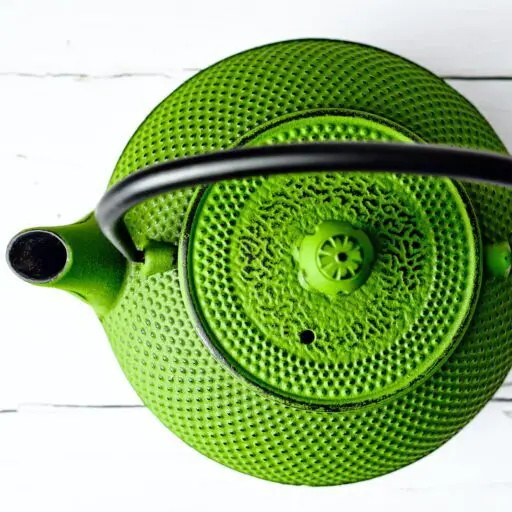Support our educational content for free when you purchase through links on our site. Learn more
Which Is the Healthiest Tea to Drink? Top 8 Picks for 2025 🍵
Ever wondered which tea truly deserves the crown as the healthiest brew? With so many varieties—from antioxidant-packed green tea to soothing herbal infusions like rooibos and hibiscus—it’s easy to get lost in the steeping swirl of choices. Did you know that drinking just 3 cups of certain teas daily can significantly reduce your risk of heart disease and boost metabolism? But which teas deliver the best health benefits without compromising taste or caffeine tolerance? Stick with us as we unravel the secrets behind the top 8 healthiest teas you should be sipping in 2025, and discover brewing tips that maximize every drop of goodness.
Whether you’re a longtime tea lover or just starting your wellness journey, this guide from the tea tasters at Tea Brands™ will help you pick the perfect cup tailored to your health goals. Ready to steep smarter and sip healthier? Let’s dive in!
Key Takeaways
- Green tea and matcha lead the pack with powerful antioxidants and metabolism-boosting properties.
- Black tea offers heart health benefits and a robust flavor for caffeine lovers.
- Rooibos and hibiscus teas provide caffeine-free alternatives packed with unique health perks like blood pressure regulation.
- Brewing technique matters: water temperature and steeping time can make or break your tea’s health benefits.
- Be mindful of caffeine content and potential interactions if you have sensitivities or take medications.
👉 Shop the healthiest teas now:
- Twinings Green Tea on Amazon | Yogi Tea Matcha on Amazon
- Traditional Medicinals Rooibos Tea on Walmart | Celestial Seasonings Hibiscus Tea on Amazon
Table of Contents
- Quick Tips and Facts About the Healthiest Teas 🍵✅
- The Leafy Legacy: A Brief History of Tea and Its Health Benefits 🌿📜
- 1. Green Tea: The Antioxidant Powerhouse You Need to Sip 🍃💪
- 2. Matcha Magic: Why This Powdered Green Tea Tops the Health Charts ✨🍵
- 3. Black Tea Benefits: More Than Just a Morning Kick ☕🔥
- 4. Oolong Tea: The Metabolism Booster You Didn’t Know You Needed 🐉🔥
- 5. White Tea Wonders: The Gentle Giant of Antioxidants 🌸✨
- 6. Hibiscus Tea: The Tart and Tangy Heart Helper ❤️🌺
- 7. Rooibos Tea: The Caffeine-Free Antioxidant Alternative from South Africa 🌍🍂
- 8. Lemon Verbena Tea: The Soothing Citrus Elixir 🍋🌿
- Herbal Teas vs. True Teas: What’s Healthier? 🌱❓
- How to Brew the Healthiest Cup: Tips for Maximizing Benefits ☕🔬
- Tea and Weight Loss: Which Brews Boost Your Metabolism? ⚖️🔥
- Caffeine Content in Healthy Teas: What You Need to Know ⚡❌
- Potential Risks and Side Effects: When Healthy Tea Isn’t So Healthy ⚠️☠️
- Tea Brands We Love: Our Top Picks for Healthy Teas 🏆🍃
- Was This Article Helpful? Share Your Tea Tales! 📣🍵
- Conclusion: Steeping in the Healthiest Choices 🏁🍵
- Recommended Links for Tea Lovers and Health Nuts 🔗🍃
- FAQ: Your Burning Questions About Healthy Tea Answered 🔥❓
- Reference Links: Trusted Sources Behind Our Tea Expertise 📚🔍
Quick Tips and Facts About the Healthiest Teas 🍵✅
As tea enthusiasts at Tea Brands™, specializing in Sip and Savor the Finest Tea, we’re often asked, which is the healthiest tea to drink? Before diving into the details, here are some quick tips and facts:
- Green tea is often considered one of the healthiest due to its high antioxidant content.
- Herbal teas, like peppermint and chamomile, offer calming effects and are caffeine-free.
- Rooibos tea is a great option for those sensitive to caffeine, as it’s naturally caffeine-free.
To learn more about the 10 Biggest Tea Brands in the World You Must Know (2025), check out our in-depth article.
Benefits of Tea Consumption
Regular tea consumption has been linked to various health benefits, including improved heart health, enhanced cognitive function, and even weight loss. For a deeper dive into the Health Benefits of Tea, visit our dedicated category.
The Leafy Legacy: A Brief History of Tea and Its Health Benefits 🌿📜

Tea has a rich history that spans thousands of years, with its origins tracing back to ancient China. Over time, tea has become an integral part of many cultures, not just for its taste but also for its numerous health benefits. According to Medical News Today, various types of tea have been studied for their potential health benefits, including green tea, jasmine tea, and rooibos tea.
1. Green Tea: The Antioxidant Powerhouse You Need to Sip 🍃💪
Introduction to Green Tea
Green tea is renowned for its high antioxidant content, which can help protect against cell damage and reduce the risk of certain diseases. A study published on Healthline found that green tea extract can improve brain function and boost metabolism.
Rating Green Tea
| Aspect | Rating (1-10) |
|---|---|
| Antioxidant Content | 9 |
| Taste | 8 |
| Caffeine Content | 6 |
| Overall Health Benefits | 9 |
2. Matcha Magic: Why This Powdered Green Tea Tops the Health Charts ✨🍵
Matcha, a powdered form of green tea, has gained popularity for its concentrated nutritional benefits and unique preparation method. According to Everyday Health, matcha contains high levels of L-theanine, which can promote relaxation and focus.
3. Black Tea Benefits: More Than Just a Morning Kick ☕🔥
Black tea, while often overshadowed by green tea in terms of health benefits, has its own set of advantages. It contains theaflavins, which may help lower cholesterol levels and improve heart health, as noted by OSF Healthcare.
4. Oolong Tea: The Metabolism Booster You Didn’t Know You Needed 🐉🔥
Oolong tea, partially fermented, offers a unique blend of benefits from both green and black tea. It’s known for its potential to aid in weight loss and improve skin health. For more on Specialty Blends like oolong tea, visit our category page.
5. White Tea Wonders: The Gentle Giant of Antioxidants 🌸✨
White tea, the least processed of all teas, retains a high amount of antioxidants. It’s also very low in caffeine, making it an excellent choice for those sensitive to caffeine. Learn more about the benefits of white tea and other Herbal Tea options.
6. Hibiscus Tea: The Tart and Tangy Heart Helper ❤️🌺
Hibiscus tea, made from the flowers of the hibiscus plant, is known for its potential to lower blood pressure and aid in weight loss. It’s also rich in vitamins and minerals. Check out Tea Brand Spotlights for hibiscus tea brands.
7. Rooibos Tea: The Caffeine-Free Antioxidant Alternative from South Africa 🌍🍂
Rooibos tea, native to South Africa, is a caffeine-free alternative that’s rich in antioxidants. It’s also known for its soothing effects on the digestive system. For a guide on how to choose the best rooibos tea, visit our Tea Brand Guides.
8. Lemon Verbena Tea: The Soothing Citrus Elixir 🍋🌿
Lemon verbena tea, with its light, citrusy flavor, is not only a delight to drink but also offers potential benefits in reducing inflammation and aiding in weight loss.
Herbal Teas vs. True Teas: What’s Healthier? 🌱❓
The debate between herbal teas and true teas often comes down to personal preference and specific health goals. True teas, derived from the Camellia sinensis plant, offer a range of health benefits, while herbal teas provide unique advantages due to their diverse ingredients.
How to Brew the Healthiest Cup: Tips for Maximizing Benefits ☕🔬
Brewing the perfect cup of tea involves more than just steeping leaves in hot water. Factors like water temperature, steeping time, and the quality of the tea leaves themselves can significantly impact the final product’s nutritional content and taste.
Tea and Weight Loss: Which Brews Boost Your Metabolism? ⚖️🔥
Certain teas, such as green tea, oolong tea, and pu-erh tea, have been linked to weight loss due to their potential to increase metabolism and fat burning. However, it’s essential to remember that tea is just one part of a healthy weight loss regimen.
Caffeine Content in Healthy Teas: What You Need to Know ⚡❌
While caffeine can be a concern for some, many teas contain less caffeine than coffee. Understanding the caffeine content in your favorite teas can help you make informed choices, especially if you’re sensitive to caffeine.
Potential Risks and Side Effects: When Healthy Tea Isn’t So Healthy ⚠️☠️
Like any food or drink, teas can have side effects, especially when consumed in excess. Allergic reactions, interactions with medications, and an imbalance of certain nutrients are potential risks to be aware of.
Tea Brands We Love: Our Top Picks for Healthy Teas 🏆🍃
At Tea Brands™, we’re passionate about sharing the best teas for your health and taste buds. From Twinings to Yogi Tea, we’ve got you covered.
- Twinings: Amazon | Walmart | Twinings Official Website
- Yogi Tea: Amazon | Etsy | Yogi Tea Official Website
Was This Article Helpful? Share Your Tea Tales! 📣🍵
We hope this comprehensive guide has helped you navigate the world of healthy teas. Whether you’re a long-time tea enthusiast or just starting your journey, we invite you to share your favorite tea experiences and recommendations with us.
Conclusion: Steeping in the Healthiest Choices 🏁🍵

After our deep dive into the world of teas, it’s clear that there’s no one-size-fits-all healthiest tea—but some definitely stand out as champions for your health and taste buds! From the antioxidant-rich green tea and its superstar cousin matcha, to the soothing and caffeine-free rooibos and hibiscus teas, each brew offers unique benefits that can fit your lifestyle and wellness goals.
Positives & Negatives at a Glance:
- Green Tea & Matcha: ✅ Packed with antioxidants and metabolism boosters; ❌ contains caffeine, which might not suit everyone.
- Black Tea: ✅ Heart-healthy and energizing; ❌ higher caffeine content than green tea.
- Rooibos Tea: ✅ Naturally caffeine-free with antioxidants; ❌ less studied than true teas.
- Hibiscus Tea: ✅ Supports blood pressure regulation; ❌ tart flavor might not be for everyone.
- Lemon Verbena & Herbal Teas: ✅ Anti-inflammatory and calming; ❌ benefits vary widely depending on the herb.
Our expert tasters at Tea Brands™ recommend starting with green tea or matcha if you want a powerful health boost with a bit of caffeine kick. For caffeine-sensitive folks or evening sipping, rooibos and chamomile are excellent choices. Remember, the healthiest tea is the one you enjoy enough to drink regularly!
Ready to steep your way to better health? Keep experimenting with different teas and brewing methods—we promise, the journey is as delightful as the destination. And if you want to explore the biggest tea brands shaping the market, don’t miss our article on the 10 Biggest Tea Brands in the World You Must Know (2025) 🍵.
Recommended Links for Tea Lovers and Health Nuts 🔗🍃
👉 CHECK PRICE on:
- Twinings Green Tea: Amazon | Walmart | Twinings Official Website
- Yogi Tea Matcha Green Tea: Amazon | Etsy | Yogi Tea Official Website
- Traditional Medicinals Rooibos Tea: Amazon | Walmart | Traditional Medicinals Official Website
- Celestial Seasonings Hibiscus Tea: Amazon | Walmart | Celestial Seasonings Official Website
Recommended Books:
- The Tea Book: All Things Tea by Louise Cheadle & Nick Kilby — Amazon
- The Art and Craft of Tea by Joseph Uhl — Amazon
- Healing Herbal Teas by Sarah Farr — Amazon
FAQ: Your Burning Questions About Healthy Tea Answered 🔥❓

What are the top 5 healthiest teas to drink daily for maximum benefits?
Green tea, matcha, black tea, rooibos, and hibiscus top the list due to their rich antioxidant profiles and scientifically supported health benefits. Green tea and matcha provide potent polyphenols like EGCG, which support brain health and metabolism. Black tea offers heart health benefits and improved blood sugar control. Rooibos is caffeine-free and packed with antioxidants, ideal for sensitive individuals. Hibiscus tea is excellent for blood pressure regulation and cardiovascular support. Drinking a variety of these teas can maximize your health benefits while keeping your palate excited!
Read more about “15 Healthiest Tea Brands You Must Try in 2025 🍵”
How does green tea compare to black tea in terms of health benefits and antioxidants?
Green tea is less oxidized than black tea, preserving higher levels of catechins such as EGCG, which are powerful antioxidants linked to cancer prevention and cognitive benefits. Black tea, fully oxidized, contains theaflavins and thearubigins, which also have antioxidant and heart-protective effects but differ chemically. Both teas contain caffeine, though black tea generally has more. If you want a gentler caffeine boost with higher antioxidant potency, green tea is your go-to. For a bolder flavor and cardiovascular benefits, black tea shines.
Are herbal teas as effective as traditional teas in promoting overall health and wellness?
Herbal teas, made from flowers, roots, and herbs, offer unique health benefits but differ from traditional teas derived from Camellia sinensis. For example, chamomile aids relaxation and sleep, peppermint supports digestion, and hibiscus helps regulate blood pressure. However, herbal teas generally lack caffeine and some polyphenols found in true teas. They are excellent for specific wellness goals and caffeine-free options but may not provide the broad antioxidant spectrum of traditional teas. Combining both types can create a balanced tea routine.
Can drinking tea regularly help reduce the risk of chronic diseases such as heart disease and cancer?
Yes! Numerous studies, including those summarized by OSF Healthcare, show that regular tea consumption—especially green and black teas—can reduce the risk of cardiovascular disease and certain cancers. The antioxidants and anti-inflammatory compounds in tea help protect cells from damage, improve blood vessel function, and regulate cholesterol. Drinking 3 or more cups daily is often associated with these benefits, but moderation and variety are key.
How much caffeine is safe to consume from tea daily?
Most adults can safely consume up to 400 mg of caffeine daily, roughly equivalent to 8 cups of tea. However, individual sensitivity varies. Green tea contains about 30-35 mg per cup, black tea around 40-50 mg, and herbal teas are usually caffeine-free. If you’re caffeine-sensitive or pregnant, limit intake accordingly and opt for herbal or decaffeinated teas.
Can tea interact with medications or cause side effects?
Yes, certain teas and herbal infusions can interact with medications or cause side effects. For example, green tea’s vitamin K content may affect blood thinners, and some herbs can alter drug metabolism. Excessive consumption of some teas may cause stomach upset or insomnia due to caffeine. Always consult your healthcare provider before making significant changes, especially if you take medications or have health conditions.
Reference Links: Trusted Sources Behind Our Tea Expertise 📚🔍
- Medical News Today: Health Benefits of Tea
- Everyday Health: Best Teas for Your Health
- OSF Healthcare: Spill it: Is drinking tea healthy for you?
- Twinings Official Website
- Yogi Tea Official Website
- Traditional Medicinals Official Website
- Celestial Seasonings Official Website
For more expert tea insights and guides, visit our Tea Brand Spotlights and Health Benefits of Tea categories.


